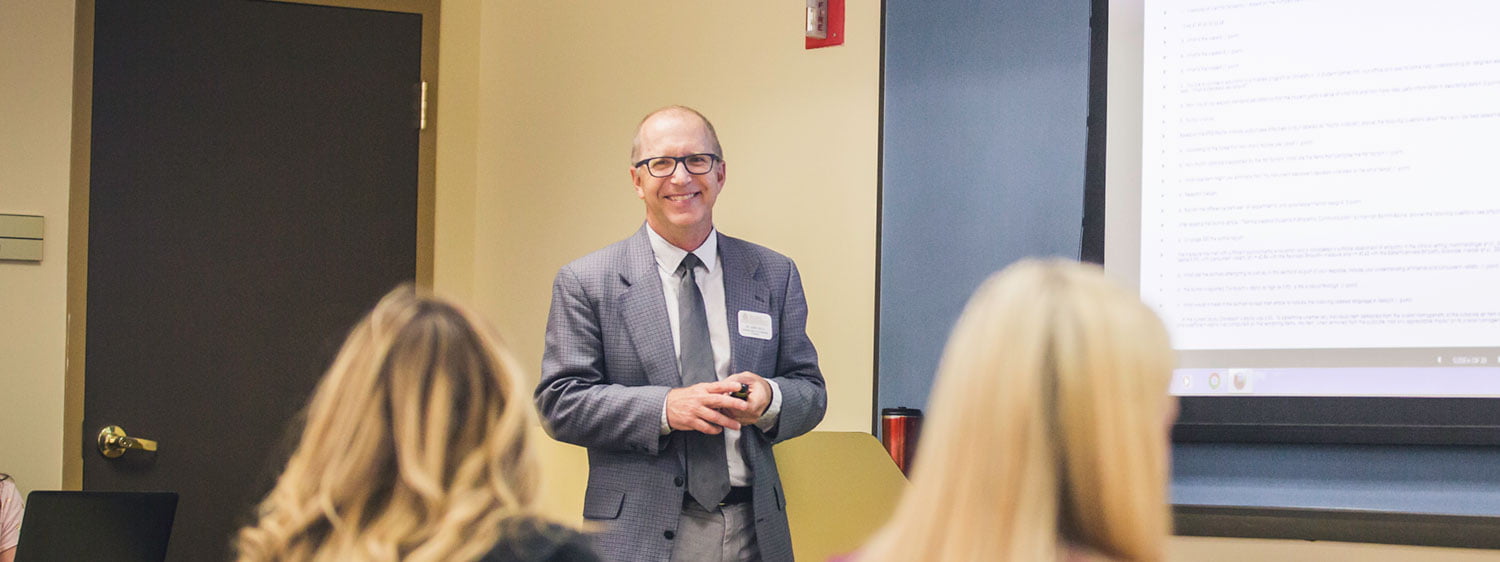
M.S. in Psychology
Earn Your Psychology Master’s Degree
The Master of Science in Psychology, offered online, will prepare you to use principles of psychology in industries including academic, science, healthcare and business. Explore the core areas of psychological science, ranging from cognitive neuroscience to the dynamics of human social interactions.
Become Highly Specialized
Choose the concentration that best fits your interests and career goals.
Gain Knowledge for Higher Learning
Be equipped to study at the doctoral level in basic science or applied psychology.
Prepare to Make a Lasting Difference
Join a respected network of Regent mental health practitioners leading in their field through the integration of science and faith. Courses are taught from a Christian worldview by renowned faculty in Virginia Beach and beyond.
ALIGN YOURSELF WITH EXCELLENCE
Regent has been ranked among Top National Universities by the U.S. News & World Report for two consecutive years (2019 and 2020). Experience the Regent difference through the Master of Science in Psychology degree program.

|

|
Upon completion of the M.S. in Psychology degree, you will be able to:
- Learn critical prevention, training, and treatment practices from a multicultural focus.
- Gain skills in employee evaluation and development to enable professional and organizational growth.
- Immerse in a gateway to study at the doctoral level in basic science or applied psychology.
Career Opportunities
- Organizational Consultant
- Researcher
- Industrial-Organizational Psychologist
- Cyberpsychologist
- Leadership Coach
The Master of Science (M.S.) in Psychology – Addictions will prepare you to apply principles of psychology while assessing addictive disorders and constructing treatment plans and faith-based interventions.
Learn MoreThe Master of Science (M.S.) in Psychology – Cyberpsychology will help you understand online interactions by examining how people engage in cyberspace, so you can develop strategies that improve human-technology interactions in social, interpersonal and organizational settings.
Learn MoreThe Master of Science (M.S.) in Psychology – Doctoral Preparation will teach you training and treatment techniques from a multicultural focus while presenting you with the opportunity to conduct, write and successfully defend a thesis in psychology.
Learn MoreThe Master of Science (M.S.) in Psychology – Industrial-Organizational Psychology will expand your understanding of employee conduct and attitudes and equip you to make a positive difference on productivity, hiring, morale, and more.
Learn MoreThe Master of Science (M.S.) in Psychology – Leadership Coaching will teach you how to build coach-client relationships, design coaching interventions and develop client-generated goals, so you can help people advance personally and professionally.
Learn MoreThe Master of Science (M.S.) in Psychology – Marriage & Family will equip you with principles that help build healthy relationships and improve family units while you expand your understanding of behavioral healthcare and selected issues associated with marriage counseling.
Learn MoreHistorical development, current state, and emerging trends of psychology both as a profession and scientific discipline. An orientation is provided to the program to graduate study in the field, and to ethics in psychology. The integration of Christianity and contemporary psychology will be examined.
Statistical methods and their application to psychological research. Surveys the collection, organization and analysis of data utilizing hypothesis testing. Evaluates various frequency distributions and measures of central tendency. An emphasis will be placed on the application of correlational and one-way ANOVA techniques.
Continued graduate instruction in statistical methods and their application to psychological research with a particular emphasis on Multivariate ANOVA techniques. Prerequisite: GPSY 510.
Surveys the range of research methods utilized in contemporary psychology with a primary emphasis on quantitative research including both experimental and non-experimental designs.
Reviews the biological determinants and influences on psychological functioning with a focus on the structure and function of the central nervous system.
Major theories, issues, data and research methodologies in social psychology. Current research literature on social perception, prejudice, helping behavior, and social conformity.
Affective neuroscience, cognitive psychology and motivational psychology. Attention and perception, consciousness, thinking and reasoning, memory, language, and motivational factors in human and animal functioning.
Human growth and development across the life span. Particular emphasis on the physical, social, cognitive, emotional, and spiritual growth of the individual with a review of current research.
The integration of Psychology and Christianity. The history of the integration project, various models of integration in science and applied psychology, and emerging trends in light of classic and current scholarly contributions to the area.
2020-2021 Semester Check-In Deadlines:
All new students are expected to check-in for the semester 2 weeks prior to the session start date. Students should apply, be accepted, enroll in their first courses, and confirm a plan to pay for their courses prior to this date.
| Session | Semester Check-In | Session Start Date |
| Session A | Friday, August 14 | Monday, August 24 |
| Session M | Friday, September 11 | Monday, September 21 |
| Session B | Friday, October 16 | Monday, October 26 |
| Session C | Tuesday, January 5 | Monday, January 11 |
| Session T | Friday, January 29 | Monday, February 8 |
| Session D | Friday, March 5 | Monday, March 15 |
| Session E | Friday, April 30 | Monday, May 10 |
| Session F | Friday, June 11 | Monday, June 21 |
Prerequisites:
Master’s applicants must:
- Hold a B.A. or B.S. from a regionally accredited college or university. Desirable degrees include those in counseling, psychology or related human behavioral fields. Other degree fields will also be considered.
- Have a minimum of a 2.75 GPA for all undergraduate coursework (3.0 preferred).
Application Process:
The Admissions Committee may require a brief Admissions Interview on a case-by-case basis. Interviews are conducted over the phone or Skype with one of our Admissions staff and/or SPC faculty members and typically take 20 minutes.
Step 1: Application
Submit your application using our Regent University Online Application.
Step 2: Application Fee
Pay the nonrefundable $50 application fee by check or money order mailed to Regent University, Enrollment Support Services, 1000 Regent University Drive, Virginia Beach, VA 23464.
Step 3: Submit your Unofficial College Transcripts*
We are able to examine and view your unofficial transcript from a U.S.-based school, which indicates successful completion of a bachelor’s degree program, in order to review you for an admissions decision. Please submit your unofficial transcript to our Admissions Office by email to apply@regent.edu using the subject line: SPC Master’s Application Pieces.
Non-U.S. transcripts must be evaluated by an NACES-approved company. For further details, please review the International Admissions Checklist on the International Students Admissions page.
International Applicants: Please visit the International Students Admissions page for a more detailed explanation of the Regent University application information and to determine whether or not you qualify as an international student.
*Upon conditional acceptance to the program by review of unofficial transcripts, Regent University’s Admissions Office will attempt to obtain your official transcripts from your U.S. degree-granting institution, which indicate successful completion of a bachelor’s degree program. We will notify you if your previous institution will not release transcripts directly to us.
Step 4: Complete an Academic Background Questionnaire
Step 5: Government-Issued ID
To ensure academic integrity, Regent University requires a copy of a government-issued ID. Please email a scanned copy or photograph of it to apply@regent.edu with the subject line: Government ID.
Please feel free to contact the Office of Admissions at 757.352.4498 or email psycounadmissions@regent.edu, should you have any further questions about the application process.
Note: All items submitted as part of the application process become the property of Regent University and cannot be returned.
2019-20 Tuition Rates
| Degree Level / Program | Cost Per Credit Hour |
|---|---|
M.S. in Psychology | $675 per credit (In-state & Out-of-state) |
Student Fees Per Semester
| University Services Fee (Online Students) | $550 |
2020-21 Tuition Rates
| Degree Level / Program | Cost Per Credit Hour |
|---|---|
M.S. in Psychology | $675 per credit (In-state & Out-of-state) |
Student Fees Per Semester
| University Services Fee (Online Students) | $600 |
*Rates are subject to change at any time.
- A.S. in Psychology
- B.S. in Professional Studies – Psychology
- B.S. in Psychology
- Ed.D. – Educational Psychology
- M.A. in Clinical Mental Health Counseling
- M.A. in Human Services
- M.A. in Human Services – Christian Counseling
- M.A. in Human Services – Conflict & Mediation Ministry
- M.A. in Human Services – Criminal Justice & Ministry
- M.A. in Human Services – Human Services Counseling
- M.A. in Human Services – Trauma & Crisis Counseling
- M.A. in Marriage, Couple & Family Counseling
- Ph.D. in Counseling & Psychological Studies – International
- Ph.D. in Counseling & Psychological Studies – Research
- Psy.D. in Clinical Psychology

